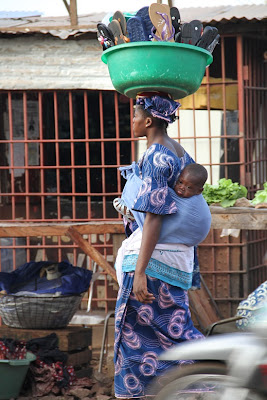The young Ali is desperate. He is 15 years old and HIV positive. He takes, twice a day, his anti-retroviral medication and feels fairly strong. Still, he believes there is no future ahead for him. He says: “Who is going to want to marry him one day, or have kids with him, if he’s HIV positive?”
His doctor, Dr. Anta Koita called him yesterday to her clinic in Bamako. Dr. Koita wanted Ali to meet another patient of hers, a beautiful teenager, Fatima and her baby girl. Fatima is also HIV positive, but thanks to the treatments she was able to have an HIV negative baby. She even was able to breast feed her for 8 months without transmitting the virus to the newborn.
When we entered the room the three of them were having an animated, frank discussion, while Fatima’s baby laid on the floor behind a desk, taking a nap.
Only ten years ago, HIV would have been a sure death sentence for Ali, Fatima, her baby daughter and most people infected in Mali, and the rest of Africa, for that matter. It was not until 2004 that thanks to coordinated international intervention, that anti-retroviral treatments became more available in Africa.
Ali was reminded by her doctor of the great progress that has been made in the science of AIDS and the local delivery of treatments.
Still, Ali has additional questions. All of them posed in Bambara, the local language that is most commonly used in the south of Mali. (French is the official language of Mali, but not everybody has had the same level of access to education in French).
Ali’s questions were good and difficult: “Am I going to have to take two pills every day for the rest of my life? Why do I have to take my pill twice a day when people in Europe and the United States have drugs that are taken only once a day? Why are we not getting the same treatment? Are they keeping their good drugs and sending down to us the bad ones?”
AIDS may not be the plague that used to be, but being infected with HIV continues to be disproportionally dangerous for people in Africa. The continent of Africa accounts only for approximately 15% of the population of the world, but Sub-Saharan Africa alone accounted for 69 percent of all people living with HIV and 70 percent of all AIDS deaths in 2011.
In developing nations, patients have access to routine tests that allows doctors to monitor the viral load on a patient, assuring that HIV positive people are being properly treated and that the medication is taking effect. As Dr. Robert Murphy, from the International AIDS Education Project and faculty member at Northwestern University explained: “Treating HIV patients, without monitoring their viral load, is like driving a car blindfolded.”
On top of this, patients in Africa suffer more commonly the dangers of many infectious diseases, mainly TB, the most common opportunistic infection affecting HIV patients and the leading cause of death among people with HIV. International programs to fight HIV and to fight TB are often isolated from each other, making it very difficult for patients to receive preventive treatments and proper monitoring.
So some of those tough questions from Ali may not be, at all, out of place. Coming here and learning first hand from HIV doctors and patients is definitively opening my eyes… more questions to come.
(Ali and Fatima are fictitious nicknames for the patients)






